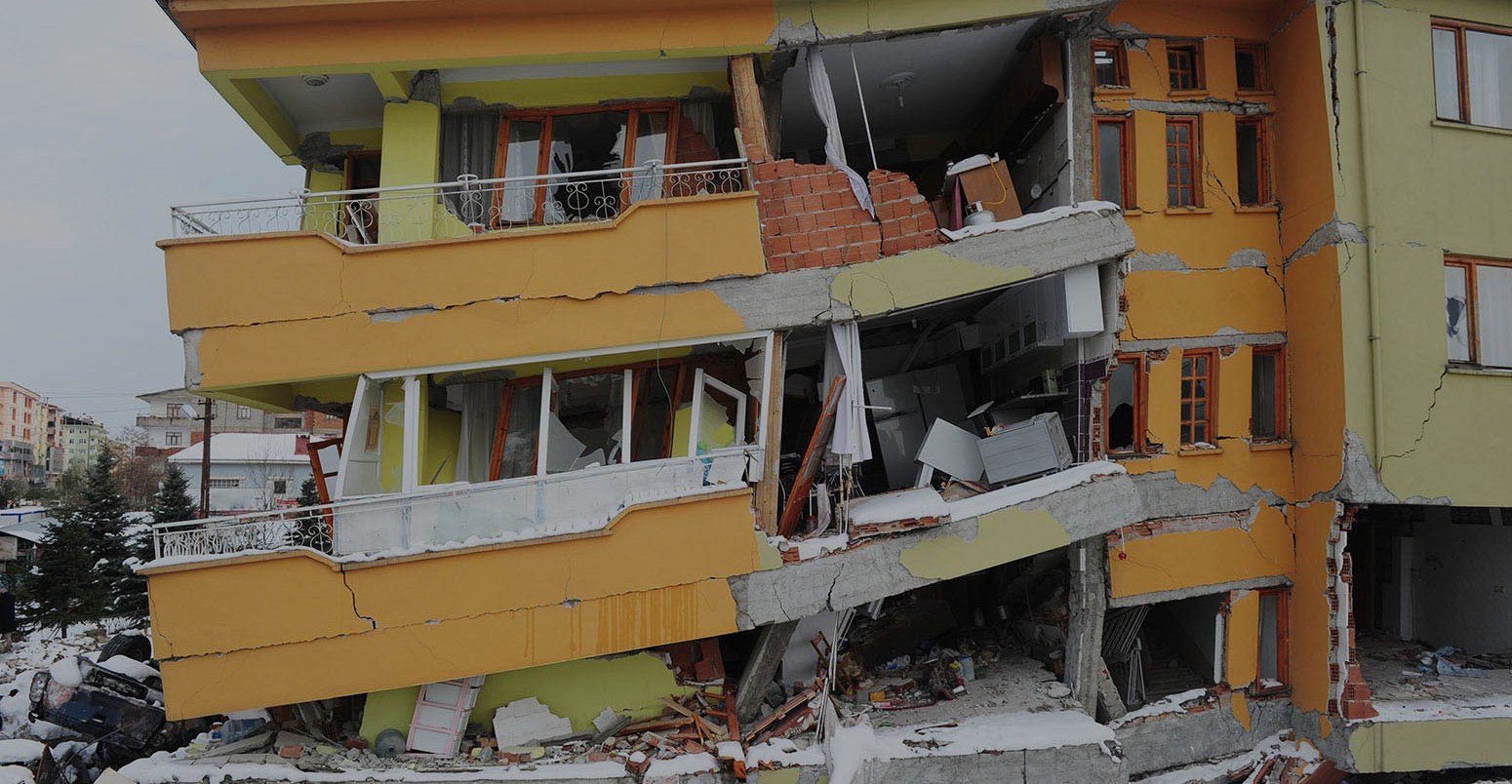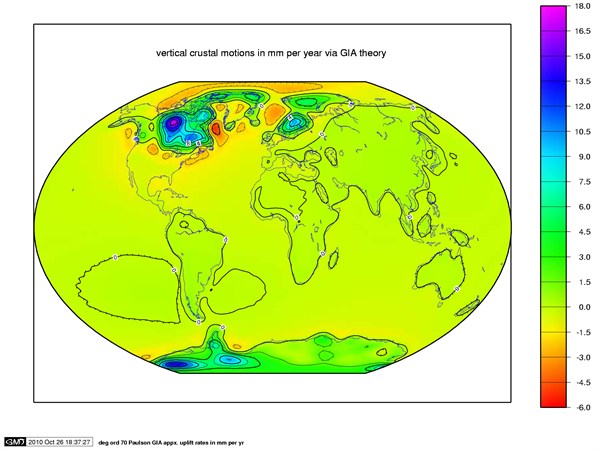
Can climate change cause earthquakes? We look at the science and the spin
Carbon Brief Staff
06.11.12Carbon Brief Staff
11.06.2012 | 12:30pmA new book suggesting a link between man-made climate change and increased seismic events has got some stick. A look at the science shows the theory isn’t nearly as mad as it’s made out to be – but it doesn’t necessarily merit the apocalyptic publicity spin.
When Professor Bill McGuire of University College London introduced his new book Waking the Giant: How a changing climate triggers earthquakes, tsunamis, and volcanoes on the Guardian’s science weekly podcast a few weeks ago, he started with a warning: “It does sound a bit mad, but it isn’t…”
So do we face an age of “geological havoc” thanks to man-made climate change, as McGuire told his audience at the Hay literary festival last week? Motor journalist and climate skeptic Jeremy Clarkson doesn’t buy it, labelling McGuire’s theory “science fiction” in the Sunday Times yesterday.
It’s hard to see how anyone could invoke climate change and earthquakes in the same sentence without getting some stick, and Clarkson isn’t the only person to treat the notion that a changing climate can affect the ground beneath our feet with derision. But a closer look suggests the theory not only makes sense, it also appears to have historical precedent.
Waking the Giant
McGuire’s book examines what the planet has done in the past as the climate has changed naturally, and makes a convincing case for a historical relationship between natural climate change and some geological activity. Given the speedy nature of current climate change, it seems reasonable to take from this that our current human-driven climate change will have geological consequences – indeed, Clarkson concedes that the “theory that global warming can affect the fabric of the planet is based in fact”.
However, some of the publicity around the book has prompted headlines which ask if climate change might ” unleash geological mayhem“. This seems quite unhelpful; after all, one man’s imminent geological mayhem might be another’s long-term rumble.
We had questions about exactly what kind of changes might occur, and when. So we got in touch with McGuire and asked him if he could give us a more precise view of what he thinks might happen.
The argument
First, though, the theory. The argument goes like this: when the climate changed naturally in the past, and the planet emerged from an ice age, large ice sheets covering much of the planet retreated. They were so heavy that the resulting release of pressure on the earth’s crust caused it to ‘bounce back’, triggering earthquakes, tremors, and even volcanic activity along pre-existing fault lines.
Right now, the Earth is still responding to the end of the last ice age some 20,000 years ago when temperatures began to rise, causing large ice sheets to retreat, as shown here:

Rate of crustal bounce-back following the end of the last ice age, as modelled by Paulson et al. (2007). Source: NASA.
McGuire suggests that if man-made climate change leads to more large ice sheets disappearing – like the one covering Greenland – this could lead to more shakes, rattles and rolls.
What’s the scientific evidence?
It’s worth noting here that although the historical relationship between ice sheet retreat and geological change is pretty well documented, research looking at more recent man-made climate change is rather sparse. A 2009 meeting at University College London concluded that, since climate change in the past has probably increased some ‘geological hazards’;
“Anthropogenic climate change therefore has the potential to alter the risk of geological and geomorphological hazards through the twenty-first century and beyond. Such changes in risk have not yet been systematically assessed.”
To us that does sound like an endorsement of the general theory. But the last part says that the risks of dangerous changes in the earth’s surface due to man-made climate change haven’t yet been intensively investigated. Roland Burgmann, a geologist at the University of California, Berkeley, told Live Science (in 2007) that changes in ice cover can affect the earth’s crust, but more research is needed to work out the scale of the risk and where effects like earthquakes might happen.
What’s the timeline?
It’s also not very clear from the publicity around the book when exactly we’re supposed to be worried about any ‘geological mayhem’ occurring. Are we talking in the next century, or the next millennium?
When asked on the Guardian Science podcast whether his worries about Greenland could materialise this century, McGuire says:
“Not by the end of this century, no […].”
But contrast this with a video promoting the book, where McGuire says:
“[T]he worry is, that if we don’t act very soon, then the Earth is going to bite back with a real vengeance over the next 70-100 years.”
We put it to McGuire that this wasn’t particularly clear. He replied that, although the Greenland ice sheet is not going to fully disappear by the end of the century (it would need to be kept at a sufficiently warm temperature for a few thousand years for that to happen), there is a study suggesting that we could see more earthquakes in Greenland in coming decades.
He also said that in Alaska “the response – in the way of earthquake activity and giant landslide frequency – is already apparent”. Here he’s probably referring to research like this paper showing an increase in small earthquakes between 2002 and 2006, thought to be down to ice loss.
Of the potential for volcanic activity triggered by climate change he told us:
“[W]e don’t have a handle on how quickly we will see a response […]. It may, however, be a while before we can distinguish any elevated level of activity from the normal background. In many ways, pinning down how quickly the solid Earth will respond this time round is no easy task and has to be speculative to some degree.”
Essentially, this is the ‘it’s complicated’ caveat so common in scientific conclusions. But as you will have spotted, these explanations are couched in considerably more careful language than some of the publicity for the book.
Following the Hansen model?
There does seem to us to be a disparity between McGuire’s publicity for the book, with its emphasis on the most dramatic possible outcomes from his hypothesis, and the more careful statements he’s made in scientific papers and outside the publicity circuit.
In discussing temperature change this century in his book, McGuire’s predictions err towards the upper end of the scale, and he also talks of facing sea level rise comparable to that at the end of the last ice age, when sea level rose at an average of one metre per century – within the range of projected sea level rise for high-end scenarios of temperature rise. In both this, and his tendency to talk in stark language, McGuire seems to be borrowing a leaf from James Hansen’s book.
McGuire told us in an email:
“We are currently on a high-end emissions scenario track and prospects for getting off this any time soon look pretty bleak […]. These scenarios are Met Office Hadley Centre scenarios that build in carbon feedbacks, and are – in my opinion – very realistic. In relation to sea level, the consensus now is that a 1 – 2m rise is most likely by 2100.”
McGuire is also clearly coming from a particular viewpoint:
“The language used in scientific papers is always careful, but released from the constraints of peer-reviewed journals we are able to express our thoughts in a more personal manner – as James Hansen in the US has done so effectively. My personal opinion is that climate change will be catastrophic – even without any geological response.”
Perhaps it’s not that surprising that book authors will try and make their work sound exciting. But there are no end of newspapers willing to pounce on catastrophic visions of the future in order to perpetuate the ‘it’s an apocalypse/it isn’t happening’ see-saw that makes up the worst end of climate reporting.
McGuire is not shying away from discussing high-end scenarios, which is fair enough. But in our view he should make clear that this is what he is doing, and also more carefully communicate the uncertainty in his work. After all, it appears to be decidedly early days for this research.
-
Can climate change cause earthquakes? We look at the science and the spin

